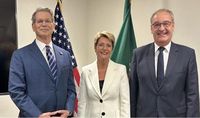The United States is set to initiate negotiations regarding import duties with a select group of 15 countries, prominently featuring Switzerland, which has been designated as a privileged partner in these discussions. This development was revealed following the participation of Swiss President Karin Keller-Sutter and Minister of Economics Guy Parmelin in the spring session of the International Monetary Fund and the World Bank held in Washington.
During their visit, the Swiss delegation engaged in a series of meetings, focusing on Switzerland's involvement in the upcoming negotiation process. President Keller-Sutter confirmed that Switzerland is among the priority nations with which the United States aims to formulate solutions concerning import tariffs. "The United States has identified a group of 15 countries with which they want to find a quick solution to the tariff issue. Switzerland is included in this group of 15 countries," she stated, as reported by Associated Press.
Currently, preparations for these negotiations are in full swing, with a statement of intent being developed. This document is expected to serve as the foundation for future discussions, with the U.S. Department of Finance actively participating in its creation. Keller-Sutter also met with U.S. Secretary of Finance Scott Bessent, where both parties reached an agreement to draft a joint document outlining key topics of mutual interest. Notably, the U.S. has appointed a specific contact person to oversee further coordination on this matter.
The Americans have expressed a strong desire to find a mutually acceptable resolution regarding duties on imports from Switzerland. Representatives from Switzerland have indicated that the amount of duties could potentially be reduced to zero, given that Switzerland does not impose import duties on industrial goods. However, it remains uncertain whether the U.S. will completely abolish these duties, as this may require compromise conditions.
As of now, specific timelines for the commencement of negotiations have yet to be established. Nevertheless, both sides have conveyed their eagerness to begin discussions promptly, as the prevailing uncertainty surrounding tariffs is adversely affecting economic conditions. Keller-Sutter emphasized, "Uncertainty is poison for the economy," highlighting the urgency of resolving these issues.
This push for negotiations comes in the wake of a significant decision made by U.S. President Donald Trump on April 2, 2025, which introduced reciprocal import duties. Under this decree, a base rate of 10% was established, with increased rates applied to 57 countries based on the U.S. trade deficit with each nation. By April 9, it was reported that over 75 countries had expressed a desire to engage in negotiations, without implementing retaliatory measures. Consequently, it was decided that a basic duty of 10% would apply to all countries, excluding China, for a period of 90 days.
Switzerland's inclusion in this privileged negotiation group underscores its significance as a trading partner for the United States. According to data released by the Swiss Embassy in Washington, the U.S. has been the most important export market for Swiss goods since 2021, while Switzerland ranks as the fourth most significant export market for U.S. services. In 2023, the trade turnover between the two countries reached a remarkable $185.9 billion.
Moreover, during a visit to Beijing on April 24, 2025, Swiss Foreign Minister Ignazio Cassis remarked that the American duties have galvanized affected countries into what he termed a "peculiar coalition" aimed at negotiating with the U.S. He noted that Germany, in particular, could face a recession this year due to the implications of the U.S. tariffs.
As these discussions unfold, stakeholders from both nations are keenly aware of the potential economic ramifications. The swift progression of these negotiations may not only impact trade relations between the U.S. and Switzerland but could also set a precedent for how the U.S. engages with other nations facing similar tariff challenges.
In summary, the U.S. and Switzerland are poised to enter a critical phase of negotiations aimed at addressing import duties, with both sides keen to find a resolution that benefits their respective economies. The outcome of these discussions will likely have far-reaching implications for international trade dynamics, particularly in light of the growing coalition of countries affected by U.S. tariff policies.




